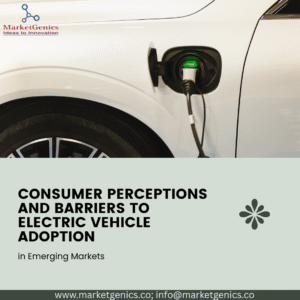The global push for sustainable transportation has brought electric vehicles (EVs) into the spotlight. However, while adoption rates in developed countries are accelerating, emerging markets still face critical roadblocks. Affordability, infrastructure, and consumer trust remain the biggest barriers, but the picture is more nuanced than it appears. Let’s find out MarketGenics analysis on the industry.
Emerging economies such as India, Brazil, Indonesia, and parts of Africa present immense growth opportunities for EV manufacturers. Yet, unlocking this potential requires a deep understanding of consumer mindsets, market limitations, and industry readiness. MarketGenics highlights the need for strategic interventions rooted in behavioral insights and structural reforms.

According to MarketGenics, the global electric vehicle market is projected to reach around USD 988.7 billion in 2025, with a compound annual growth rate (CAGR) of around 11% from 2025 to 2034. The Asia Pacific region, accounting for nearly half of this market, is expected to grow at a CAGR of 12.1% during the same period.
In emerging and developing economies in Asia (excluding China), electric car sales reached almost 400,000 in 2024, marking an over 40% increase from 2023.
Beyond consumer psychology, there are deeper, market-rooted challenges unique to emerging regions. MarketGenics identifies the following as core structural obstacles:
Unpredictable supply and pricing of lithium, cobalt, and nickel. MarketGenics can track global mining data for you, identify alternate suppliers, and forecast price trends to optimize sourcing strategy.
Companies can have difficulty in identifying reliable domestic suppliers for batteries, controllers, and semiconductors. MarketGenics does supplier landscape mapping, regional capability assessments, and risk profiling.
Fragmented or unclear EV manufacturing rules across states or countries.MarketGenics can do Policy mon itoring, compliance requirement summaries, and regulatory forecasting.
Fast-evolving tech like solid-state batteries or motor innovations can outdate existing setups. MarketGenics can do – Innovation trend tracking, patent landscape analysis, and competitor R&D monitoring.
Electric mobility is still in its early stages in many emerging nations. Although awareness around EVs is growing, consumer perception remains influenced by several concerns:
One of the most critical insights offered by MarketGenics is the growing urban–rural adoption gap. While urban consumers show increasing interest in EVs, especially two-wheelers and compact electric cars, rural markets remain largely unmoved due to poor infrastructure and service support.
MarketGenics further highlights that fleet operators in tier-2 and tier-3 cities could play a pivotal role in normalizing EVs. However, lack of government collaboration and delayed charging investments have limited this potential.
Trust in new technology plays a significant role in shaping demand. In emerging markets, many buyers still associate “new tech” with risk. MarketGenics emphasizes that:
Electric vehicles are often touted as the future of sustainable transport, but for emerging markets, the path to electrification is complex and deeply layered. Consumer concerns like high upfront costs, range anxiety, and battery reliability are just the surface. Digging deeper, market research insights from MarketGenics reveal that structural weaknesses, such as inconsistent regulations, fragmented infrastructure, supply chain dependencies, and underdeveloped financial ecosystems, pose serious challenges to EV ecosystem scalability.
The gap between aspiration and adoption will only be closed when EV strategies are backed by market-grounded decisions, long-term investment incentives, and localized product-market fit. Manufacturers and governments must co-create solutions that not only promote affordability but also build trust in the reliability, performance, and long-term value of electric vehicles.
Moreover, targeted educational campaigns, availability of financial products tailored for EVs, and a stronger resale ecosystem can catalyze demand beyond metro cities. Real acceleration will come when EVs are seen not just as eco-friendly alternatives, but as economically viable and practically dependable choices for the masses.
MarketGenics provides in-depth market intelligence and consumer insights to help EV companies align their strategies with emerging trends and buyer behavior, leading the companies to grow rapidly.


MarketGenics India is a MRSI certified company.
Send us your resume at
info@marketgenics.co
© 2025 MarketGenics India Pvt Ltd.; All rights reserved